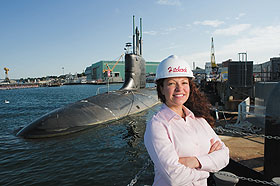Report highlights UConn’s contributions to future workforce
- February 17, 2009
|
Over a period of several weeks, the Advance is presenting sections of a report produced by University Communications, based on a study by Stanley McMillen, chief economist at the Connecticut Department of Economic and Community Development. The UConnomy report outlines the many ways UConn contributes to the state’s economic well being.
For the complete report and fast facts: www.uconn.edu/uconnomy/
Part of the report discusses how UConn equips its graduates with the knowledge they need to become among the state’s most highly skilled workers and entrepreneurs, meeting the needs of state citizens and helping attract industries that offer greater economic opportunity. This workforce ensures that Connecticut thrives in today’s increasingly competitive market.
Examples include:
- Students seeking advanced education in emerging areas of science or mathematics can do so through the College of Liberal Arts and Sciences. The Professional Science Master’s Degree Program offers degrees in financial mathematics, applied genomics, and microbial systems analysis, preparing students for careers in corporate, nonprofit, and governmental settings.
- The School of Engineering produces a pipeline of highly skilled professionals who enter the workforce or serve as professors, educating future engineers. More than 150 of the School’s Ph.D. graduates have gone on to teach at colleges and universities nationwide.
- UConn has trained about one-quarter of the state’s school superintendents and principals. Through educational administration programs offered by the Neag School of Education, students integrate academic coursework with intensive internship experiences in school leadership.
- UConn’s Law School hosts the only Insurance Law Center in the nation. The Center’s faculty serves as an international resource for the study of insurance law. Students can pursue a Master of Laws in this specialized legal field.
- According to the U.S. Health Resources and Services Administration, Connecticut will be short more than 11,000 registered nurses by 2010. UConn’s School of Nursing is addressing this shortage by recruiting students to nursing careers while also preparing students to serve as faculty.
- UConn’s schools of Medicine and Dental Medicine have graduated thousands of health professionals, many of whom go on to practice in Connecticut. The UConn Health Center continues to strengthen its ranks, recruiting MD’s and DMD’s who practice their specialty in Connecticut and also serve as faculty members.
 |
| Tabitha Hitchcock, who graduated with a degree in civil engineering, works for Electric Boat in Groton. Photo by Lanny Nagler |
- Families interested in adoption rely on the assistance of well-trained, knowledgeable professionals. UConn’s School of Social Work works with the Department of Children and Families and Southern Connecticut State University to offer a Post-Master’s Certificate in Clinical Issues in Adoption. This program establishes a group of professionals who can provide post-adoption services with clinical expertise to families who adopt children through Connecticut’s public welfare system.
- UConn’s School of Engineering graduates are inspiring companies to innovate, producing new and improved products and contributing to the economic strength of the state and nation. Engineers at participating Connecticut firms obtain advanced, on-site training through the School’s Master of Engineering Program.
- Scientists are needed by industry, academia, and the government to manage issues involving toxic substances. With full-time faculty from six University departments, the Center for Biochemical Toxicology at the School of Pharmacy trains future toxicologists, who will contribute to the protection of public and environmental health.
- Through UConn’s academic partnership with the Metropolitan Opera, the School of Fine Arts is providing students with valuable instruction in the dramatic arts and ultimately producing a new generation of professionals who will contribute to Connecticut’s vibrant arts and culture. Students have access to the famed opera house from behind the scenes, learning firsthand about opera production work.
- Connecticut employers are gaining an edge over their competition with the help of the School of Business. Finance, business law, and accounting courses offered to professionals through UConn’s Executive Education Programs provide the advanced training employees need to adapt quickly to emerging business trends, advancing technology, and global expansion. The School of Business also is home to the UConn Executive MBA program in Hartford.
- Students in the Department of Marine Sciences at Avery Point can pursue a degree in coastal studies or oceanography. They’re involved in preserving the health of Long Island Sound, studying invasive species, and promoting a strong aquaculture critical to Connecticut’s coastal fishing industry. Designated the state’s Sea Grant College, UConn belongs to a nationwide network of university partners, supported in part by the National Oceanic and Atmospheric Administration, that are working to conserve coastal and marine resources.
|
|



